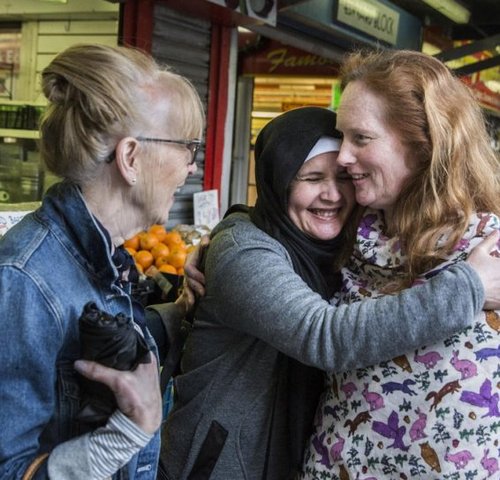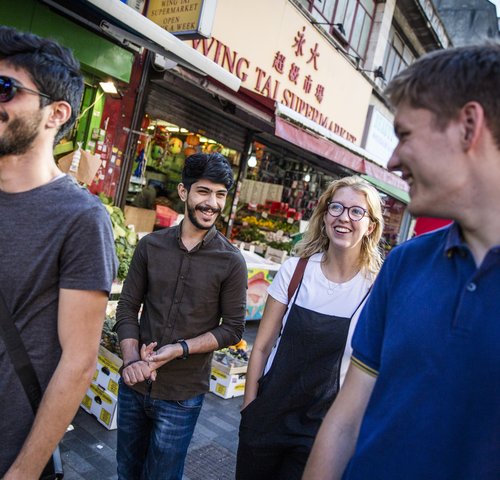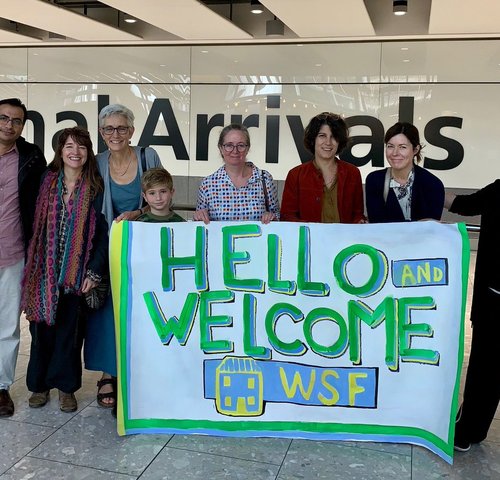Safeguarding
USEFUL RESOURCES
Guide for Designated Safeguarding Leads
Managing Boundaries Workbook (Developing Safe Working Practices)
Volunteer Registration Form Template
Handbook for Volunteers Template
Risk Assessment Template (UPDATED FOR COVID-19 PANDEMIC)
Guidance on recording and storing information (source: NSPCC)
Resources and guidance in developing safeguarding procedures from NSPCC
NSPCC Helpline: 0808 800 5000. You can call them whenever you need advice (this can be anonymous) or want to escalate a safeguarding concern.
HOW WE CAN SUPPORT YOU?
We are more than happy to arrange a phone call or visit to discuss your safeguarding plans. Get in touch at [email protected]
Your group will be working closely with a refugee family who have been prioritised for resettlement because of their vulnerability.
You will be helping them to achieve intimate tasks, such as setting up bank accounts, managing their finances, accessing healthcare, and achieving integration goals. You will therefore be in a position of great power and responsibility, with the potential to both cause or prevent harm. This relationship will also place you in a unique position to be able to spot and respond to potential harm and abuse caused by others.
For these reasons, it is vital that you develop a strong safeguarding framework, and that all family and group members are familiar with your procedures.
Adapting your support during Covid-19 Pandemic
We have developed some guidelines to adapting your support as you welcome a family during the Covid-19 pandemic.
Covid-Safe Practices - January 2021
Online safety
As this pandemic has forced us to move our support and communication online, it's even more important to think about online safety. Here are some useful resources:
Safeguarding and remote education during coronavirus (COVID-19) – UK Government Safeguarding during coronavirus: voluntary and community groups – NSPCC Safe remote learning – UK Safer Internet
What Is Safeguarding? What is the role of the Safeguarding Team? Write a Safeguarding Policy Safer Recruitment Complaints Policy and Procedures Recording and Storing Information Training Risk Assessments
What Is Safeguarding?
Safeguarding means protecting people's health, wellbeing and human rights, and enabling them to live free from harm, exploitation or abuse.
Safeguarding children - promoting their welfare includes protecting them from maltreatment or things that are bad for their health or development and making sure they grow up in circumstances that allow safe and effective care.
(Working together to Safeguard Children 2018).
Safeguarding adults - includes protecting their rights to live in safety, free from harm, exploitation or abuse, with people and organisations working together to prevent the risk of harm, exploitation or abuse, and to stop them from happening, and making sure people's wellbeing is promoted, taking their views, wishes, feelings and beliefs into account .
(Care Act/Social Services and Well-being Act, 2014)
What is the role of the Safeguarding Team?
You are required to have a Designated Safeguarding Lead(s) on your team. The DSL(s) will act as the main source of support, advice and expertise for safeguarding.
You will be responsible for…
- writing a safeguarding policy
- ensuring volunteers are recruited safely
- providing training for volunteers so that they can recognise and respond to safeguarding concerns
- referring cases of suspected harm, exploitation and abuse to the local authority social care as required.
- referring cases where a crime may have been committed to the Police as required.
- ensuring that any safeguarding concerns raised about volunteers are addressed and appropriately resolved with guidance from your Lead Sponsor.
- ensuring there is an appropriate safeguarding monitoring and reporting procedures in place.
- keeping accurate, secure, written records of safeguarding concerns and actions.
- ensuring that all safeguarding concerns are stored securely and accessed only by authorised persons.
It is NOT your responsibility to …decide whether someone has been abused or not – that is the responsibility of investigative statutory agencies like social work services or the police.
If you do not have someone with safeguarding experience on your team, there are lots of courses and trainings, such as Positive Learning or NSPCC.
Read our Guide for Designated Safeguarding Leads
Download slides from our workshop for DSLs.
Write a Safeguarding Policy
To meet the safeguarding criteria, you will need to develop a safeguarding policy. You will need to include:
- Identification of the potential risks to children and vulnerable adults
- Procedures for staff and volunteer vetting
- Procedures for staff and volunteer training
- Clear processes for how concerns are reported and escalated and information on where they can seek further guidance
- Protection measures for sensitive data
- Contact information for local safeguarding leads including local police safer neighbourhood team
You can download a template Safeguarding Policy here
Safer Recruitment
Volunteers will be in a unique position of power – they are responsible for supporting the family to access healthcare, set up a bank account, manage finances and their property. So it’s very important that you put safe recruitment procedures in place. Although there are no strict requirements from the Home Office, we would recommend that all volunteers who will work directly with the family should:
- Have a clear role description
- Meet with a member of the Core Team, who can assess suitability
- Complete a DBS check
- Provide two references
Complaints Policy and Procedures
It is vital that all family and group members know how to make a complaint or raise a concern about the behaviour of a volunteer. You should clearly explain how they can make a complaint, and to whom, and what steps will be taken in such an event.
This should be reiterated several times to the family – they will be taking in a lot of information in their first weeks in the UK, and it’s likely they will forget some details.
The Home Office have created a template policy, which you can download here:
Resource sourced from: Home Office Application Guidance, pg. 10 - 15.
Recording and Storing Information
There is no one perfect place to store information. Microsoft Office 365, Dropbox and Google Drive are safe platforms to report and save records, but only if you all know how to use and access them securely. If you are not comfortable in using computers, it may be safer to receive reports by phone call, and keep written records in a locked drawer of your house or office. The most important thing is that they are kept confidential and locked by either password or key.
The NSPCC have produced some helpful guidance about recording and storing information, which you can download here .
Read the Guide for Designated Safeguarding Leads for more detailed advice.
Training
You can view the powerpoint slides from our training for Safeguarding Leads:
Part One - What is the role of a Safeguarding Lead in Community Sponsorship?
Part Two - Volunteer Relationships - Boundaries, Transitions and Safe Practices
You can view these workshops below :
We recommend that your Safeguarding team deliver a basic workshop with volunteers who will work directly with the family. It's important that you go through your policy and procedures together, to give them the opportunity to clarify and understand. It is also important to that they know how to recognise and report any safeguarding concerns. This will also be a good chance to discuss the importance of setting boundaries between volunteers and family members. If Citizens UK are your Lead Sponsor, we can co-design and deliver this with you.
If you would like any support, resources, or guidance in this, contact [email protected]
Risk Assessments
Risk Assessments
To ensure that you, other volunteers in the Group, and the members of the refugee family are safe and secure, the Group may need to draw up Risk Assessments for certain activities.
Conducting risk assessments can seem like an unnecessary hassle, but it doesn’t need to be complicated or difficult, and in most cases, it is just a matter of common sense. If we are your Lead Sponsor, Sponsor Refugees expects that Groups will have risk assessments in place for three situations
- Transit: the transfer of the refugee family from airport to their new home on the day of their arrival in the UK
- Home-based activities: a risk assessment to cover all activities where the Group volunteers are working with the refugee family in their home
- Community-based activities: risk assessments for one off events which might involve greater risks. For example, organising a Sponsored Cycle, or a party with hundreds of attendees.


